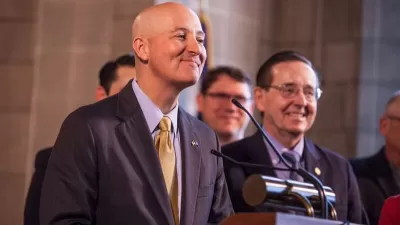Maryland and Wisconsin will not ask voters to raise taxes for transportation, but will ask them to adopt constitutional restrictions to ensure gas tax funds are not diverted for other purposes. Louisiana hopes to create an infrastructure bank.
Daniel C. Vock, Governing’s transportation and infrastructure reporter, writes that Louisiana "(o)fficials want to use (the state infrastructure bank) to let localities borrow money from the bank, which would be cheaper and less onerous than preparing a bond issue." Since "Republican Gov. Bobby Jindal has vowed not to raise taxes," the measure aims to stretch existing transportation funds by lowering borrowing costs for municipalities.
Maryland and Wisconsin have taken a different course. Rather than allowing for more flexibility with existing transportation funds, they have sought to protect them by placing "lockboxes" on them, thus creating trust funds.
Joshua Schank, the president and CEO of the Eno Center for Transportation, said constitutional amendments like the ones proposed in Maryland and Wisconsin are unusual. But he also cautioned that, even with those protections, state transportation budgets will still struggle because they are primarily funded by gas taxes that aren't keeping up with current infrastructure needs. "The days of raiding gas tax money for other things besides transportation are likely to be numbered, because the money won't be there," Schank said.
Once could ask if the lock box works in a reverse direction, i.e., not allowing general funds to flow into the trust fund, an issue raised by Wisconsin state Sen. Fred Risser (D-Madison), "one of the few dissenting voices," notes Vock.
He said there is no reason why transportation money should be treated differently than money for other programs. Under Walker, he noted, school funding was cut by $800 million while legislators actually transferred $500 million in general revenues into the transportation fund.
Indeed, transferring general funds to transportation trust funds has become de rigueur in federal government since 2008 to cover the Highway Trust Fund shortfall. Prior to the July 31 passage of the $10.9 billion patch funding bill made possible largely by 'pension smoothing', "lawmakers (had) transferred $54 billion from the U.S. Treasury's general fund to the Highway Trust Fund so it could meet its obligations in a timely manner," Joseph Kile, the assistant director for microeconomics studies at the Congressional Budget Office (CBO), told the National Journal last May.
However, the Wisconsin state legislature had borrowed state transportation funds "(t)hree separate times between 2003 and 2011 for a total of $1.4 billion, although much of that money was later repaid," writes Vock.
Voting yes on Question 1 might help in future ballot measure where voters are actually add to tax themselves to increase, say, the gas tax.
"The most negative impact [of the raids] was the fact that it just really destroyed the trust that the public had in the user fee-based system," said Craig Thompson, executive director of the Transportation Development Association of Wisconsin.
"The (gas tax) rate had been indexed to inflation, increasing from 16 cents to 31 cents between 1985 and 2006, but the indexing was eliminated under Gov. Jim Doyle," according to the Wisconsin State Journal.
Maryland, where "state lawmakers have taken more than $1 billion out of transportation funds to balance the budget" and which raised its gas tax last year, will follow a similar path, though allowing for borrowing in fiscal emergencies.
The proposed constitutional amendment would only allow the protected money to be used for non-transportation related items if the governor declared a fiscal emergency and both chambers of the General Assembly approved the transfers by a three-fifths vote.
FULL STORY: 3 States Consider Ways to Maximize Existing Transportation Money

Planetizen Federal Action Tracker
A weekly monitor of how Trump’s orders and actions are impacting planners and planning in America.

Map: Where Senate Republicans Want to Sell Your Public Lands
For public land advocates, the Senate Republicans’ proposal to sell millions of acres of public land in the West is “the biggest fight of their careers.”

Restaurant Patios Were a Pandemic Win — Why Were They so Hard to Keep?
Social distancing requirements and changes in travel patterns prompted cities to pilot new uses for street and sidewalk space. Then it got complicated.

Platform Pilsner: Vancouver Transit Agency Releases... a Beer?
TransLink will receive a portion of every sale of the four-pack.

Toronto Weighs Cheaper Transit, Parking Hikes for Major Events
Special event rates would take effect during large festivals, sports games and concerts to ‘discourage driving, manage congestion and free up space for transit.”

Berlin to Consider Car-Free Zone Larger Than Manhattan
The area bound by the 22-mile Ringbahn would still allow 12 uses of a private automobile per year per person, and several other exemptions.
Urban Design for Planners 1: Software Tools
This six-course series explores essential urban design concepts using open source software and equips planners with the tools they need to participate fully in the urban design process.
Planning for Universal Design
Learn the tools for implementing Universal Design in planning regulations.
Heyer Gruel & Associates PA
JM Goldson LLC
Custer County Colorado
City of Camden Redevelopment Agency
City of Astoria
Transportation Research & Education Center (TREC) at Portland State University
Camden Redevelopment Agency
City of Claremont
Municipality of Princeton (NJ)



























